Why do mosquitoes buzz in people’s ears?
On a less philosophical note- Dengue! The boat “situation” we did not anticipate.
When I last wrote in the beginning of March, Joe and I were basking in the glow of family visits, time with friends and the thrill of experiencing new places. I also wrote that Joe was “under the weather with a vague but worrisome illness.” Then, he got really sick. A fever above 104, skull-pounding headache that no painkiller could touch, terrible taste in his mouth and nausea. I applied ice packs, gave him medicine to reduce his fever(the wrong one as it turned out), pushed liquids, and devised multiple plans to move the boat solo so I could take him to the hospital if need be.
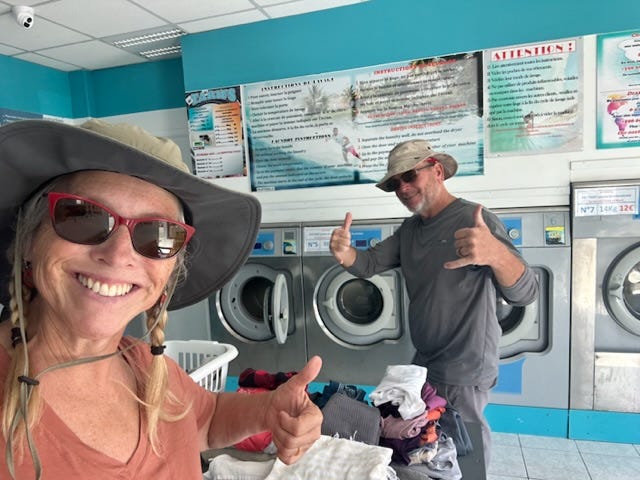

I kept busy exercising on the boat, cleaning, found a way to order some groceries(Paradise foods- the Instacart of the water in the Caribbean https://paradisefoods.com/ read, researched, worried and wondered. Did Joe have Covid? Did he have Zika? Another mosquito-borne illness?Why were my eyes bloodshot and my eyeballs felt like they’d explode from pressure?
Just as Joe’s fever lessened, I woke up feeling completely unwell. Ha, I thought, perhaps we picked up Covid and I just caught it from Joe. I swabbed- negative. I reached out to a sailor friend who is also a doctor. They wrote back immediately. They did not think it was Zika, chikungunya, or Covid; they suspected dengue. I had already looked up dengue. It is not a pretty disease. I also remember old news stories of dengue epidemics around the world, from the Time magazine of my childhood, tales and graphic photos of people dying from hemorrhaging and other complications.



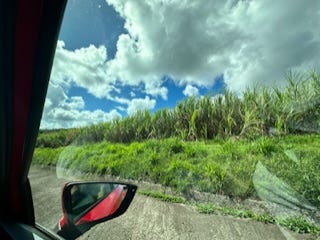

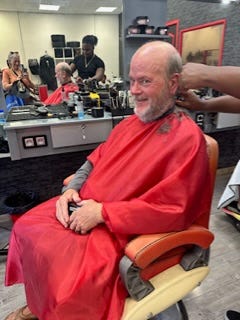

My son-in-law’s oft- repeated comment during our stay at the beautiful but mosquito-filled villa d’Aromes in Trois-Ilets played on a loop in my head: “Mosquitos kill more humans than anything else.” Was this even true? Despite patchy cell service and not feeling well, I began to research a bit obsessively. Who, me? In writing this post, a bit of a departure from our happy stories, I would like to share some things I’ve learned and ways you can protect yourself. Dengue- and other mosquito borne diseases are spreading- and dengue is now found in the continental U.S. To my son-in-law’s point, I found this: U.S. Centers for Disease Control and Prevention calls mosquitoes the “world's deadliest animal.”1 It's a weighty moniker for an insect that weighs just 2.5 milligrams,2 but it's well deserved. The diseases mosquitoes carry kill upwards to one million people a year worldwide and sicken millions more. The mosquito that carries these diseases isn’t even a proper—sized Maine mosquito. You know the kind you can feel land on you, the ones that buzz in your ear! Instead, the mosquitoes are speedy, tiny(Aaedes) striped daytime biting mosquitos. These mosquitos are spreading throughout the world and the diseases they carry with them. Dengue is now found in the United States, mostly in Florida. It turns out that Martinique had over 600 reported cases the week we were celebrating Carnival. https://www.ecdc.europa.eu/en/disease-vectors/facts/mosquito-factsheets/aedes-aegypti
In addition to our rental house, the cozy little marina where we left our boat while we visited with family was filled with mosquitoes. They were swarming as we set up the boat that first day, trapping dozens of those “daytime biting” insects inside. That night I slept with the sheet over my head. But it takes only one bite from a vector-carrying mosquito to infect someone. Geez… you can see barracuda or a shark coming for you!
For me, the first phase of dengue was marked by a milder fever(100-102), terrible bone aches, and a sore throat. That wasn’t all. There was that eye pain, a rash all over my body, and a sensitivity to tastes and smells. Food was completely nauseating and the metallic sulphuric taste in my mouth would propel me out of bed to use some mouthwash. I may never want to smell green tea disinfecting wipes used for cleaning the loo, bought on discount in Guadeloupe, ever again. As I read about the dangers of dengue, I was adamant that we confirm our diagnosis and get a platelet count, as very low platelet counts are cause for hospitalization. Repeat infections of one of the other subtypes come with increased risk of complications and death. Cytokine storm anyone?
We rented a car in Trois Ilets for two days and the first day, Joe piloted us to an English-speaking doctor in Le Marin. We found Dr. Sylvie through our Salty Dawg WhatsApp chat group. The doctor listened to us describe our symptoms, looked at me for 30 seconds after talking with us for about ten to fifteen minutes, listened to our heart and lungs and confidently told us that we had dengue. As she wrote, she explained that I was going to experience a second phase of the disease where my rash would become very painful and perhaps other symptoms, but eventually I would heal. She listed symptoms for which we should rush to a hospital. We left with a script for acetaminophen( called Paracetamol here), given with stern cautions to not take any ibuprofen or analgesics because of their blood thinning effects, and a script for blood work. We paid Dr. Sophie 64 euros for the both of us(cash only) and filled the script for just several dollars. We were told it was too late on the day to get blood tests, so would leave that until tomorrow.
After a night of intense itching(me), stomach upset and dizziness((both), Joe drove us the twenty minutes or so to the nearest laboratory I found using Google maps. As we entered, a polite and welcoming security guard gave us a number(84) which I knew I’d have to listen carefully for, as those numbers are always tricky for me in French(quatre-vingt-quatre). We waited. The time moved slowly. Every once in a while, a patient would exit, yelling a cheery Salut! or Bonjour! to all in the room. An enthusiastic response rippled back each time, more pronounced if the speaker was a chronologically-advantaged woman, a “mami.” Finally, it was out turn to fill out the paperwork and then about 20 minutes later, have our blood drawn. Speaking French turned out to be hugely helpful, as there were mistakes made with our birthdates and they were used as part of the code to obtain our results on-line. The cost for the labs was $160 euros; mine was $100, as I had more panels studied. I paid with a credit card and we were onto laundry and provisioning, a real adventure while being sick. We wanted to make the most use of our car and more than a month had passed without a real shop.
Later that afternoon, as I huffed and puffed(the illness also completely saps your energy) to the dinghy pier hauling laundry and groceries, we were both spent. The lab results arrived efficiently early that evening confirming type 2 dengue. That night the dreaded second phase began. That rash again itched and burned; the sensation was that my skin was on fire. My hands and feet swelled and turned red. GI symptoms set in and stayed for a few weeks rendering me unable to leave the boat at all. Meanwhile, Joe had a bit of a setback in healing, making those first few days rough. If you are still reading, in case you have any doubts, I do not recommend dengue to anyone. Ever. So… some of the things we’ve learned follow.
Think through your options for a medical or dental emergency when traveling to a new place, while realizing you can’t anticipate everything! When you arrive at a new place- spend a few minutes to think over worst-case scenarios. I know we think storms, anchor dragging, safety and theft… but now also medical emergencies. I’ve learned that embassies, tourist offices, cruisers around you(always my go-to), big hotels, police stations in some instances, and social media can be sources of information. No one source will cover everything. People are tending to use their vhf less, but generally cruisers are an incredible source of help and resources in any emergency. Our Salty Dawg group was invaluable. I am now sure to locate the local clinic and emergency numbers of a new place and write them on our white board. I also have both a local SIM and my American T-mobile so I can place calls.
Plan your emergency medical supplies carefully and continue to learn. We have a written inventory and a plan that we reviewed with our home doctors and travel recommendations, yet we still missed having plenty of acetaminophen on board. We did have kaopectate and ondansetron(for nausea) on board. We have some helpful herbal teas. For cruisers in the French islands at least, know that you can replenish your medical supplies at a pharmacy if you bring your medication list and ship’s papers. You can also get many routine scripts renewed if you bring a current medication container.
Stay connected. Plan for evacuation and stateside support. We currently have DAN cruising insurance but I am researching others, as I haven’t found them overly responsive both times I’ve reached out to them: once this year and once last year. Having access to medical expertise on WhatsApp and Messenger was amazing and comforting.
Get recommended vaccines. I scrambled to complete my hepatitis series before coming here but found that in New York State I could not get the typhoid vaccine but it is available in Maryland and Pennsylvania. The dengue vaccine is pretty complex. I will write a bit more below.
Preventative and Routine Maintenance. Not just for the boat! This list is individualized, but both of us are now interested in making sure our major systems are functioning well, or we at least know sources of potential issues. We will also ask more questions about rental properties. Many places do not have screens- shutters have been the norm- but times are a’changing. We have screens for all the hatches and the companionway but they are not foolproof. We also didn’t generally wear bug spray during the day, but since I was sick, I’ve received multiple messages from people hiking who said they were wearing their DEET bug spray in honor of us.
Chart showing the prevalence of dengue: https://www3.paho.org/data/index.php/en/mnu-topics/indicadores-dengue-en/dengue-nacional-en/252-dengue-pais-ano-en.html%20
After hearing our experience, which included a sail into Fort de France and a trip to the hospital for me, our nomadic friends and cruisers want to know about the vaccine. I’ve spent some time researching this, particularly after I traveled through the very overburdened emergency room system. That adventure only reinforced the desire to “do better” with all the things on the list above but still. Not all things are in our control! That may be the primary rule of life and life on a boat encapsulates this!
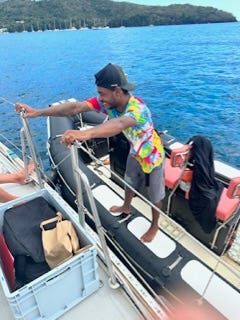

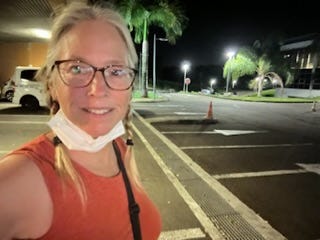
Dengue is comprised of at least four subtypes. Only about 25% of people who are infected show symptoms; weren’t we lucky? Once you’ve had one subtype, you’ve gained lifelong immunity to that type. It does not, however, protect your from the other subtypes. If you get another type more than 18 months post-infection, you are more likely to provoke a heightened immune response or cytokine storm. This can look like plasma leakage, liver failure, hemorrhages and the like. It is impossible to tell, at least at this point, who may end up with these complications that can happen quickly. Statistically, people above 65, women, and people with other underlying conditions like diabetes, obesity and the like are more likely to have complications, but there are enough totally healthy people who end up with complications that everyone must take it seriously if they are sick. If that news isn’t cheery enough, there are no approved treatment or antivirals. Death in areas with adequate hospital facilities is reassuring low (1-3%) but without treatment when needed 20-25%. And the vaccine?
As of March 2024, the second-generation dengue vaccine (QDENGA) is available to adults in Argentina, Brazil, Denmark, Europe, Germany, and India. It is a live vaccine, so may not be suitable for everyone. I could not confirm that it is available to ages 60 and older in the UK, the restriction in other countries. There isn’t any evidence that it isn’t safe or effective in older populations; studies are just not completed. Running trials on all four subtypes is expensive and time-consuming. Dengue doesn’t have the highest efficacy, but it is found to protect against complications 80-90% of the time for up to six years, with waning efficacy. I’ll take those odds!
As I wrote in the beginning, I understand that this is a departure from my usual writing, but with dengue on the move into more urban areas and spread into so many new areas in the world, just like Lyme and other tick diseases in the northeastern United States, we want to educate and protect ourselves. I wish you happy travels and hope the only experience you’ll have with dengue is reading this blog post! And why do mosquitos buzz in people’s ears? They want to know if people are still angry with them… Dragonflies love to snack on them but the rest of us? What do you think?
Eligibility for dengue vaccine- children: https://www.cdc.gov/dengue/vaccine/parents/eligibility.html
A paper on the why it is challenging to bring a viable dengue vaccine to people: https://www.nature.com/articles/s41541-023-00658-2.pdf
Note: I am not able to make the links live in the app but you can copy and paste. Apologies! It’s good stuff.
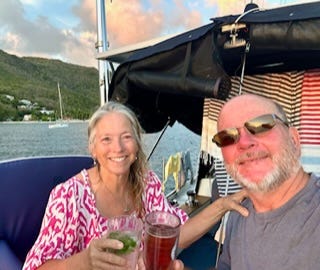

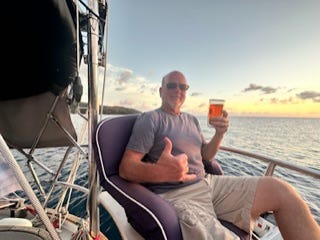






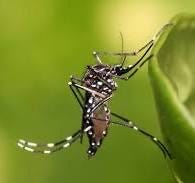
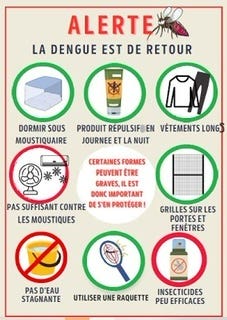
Thinking of you! I believe I will make a westward trek this fall! 🏔️
Thanks, Keith. That means a lot 😊 with all your background in safety and traveling. I hope your road to full mobility is as smooth as possible.